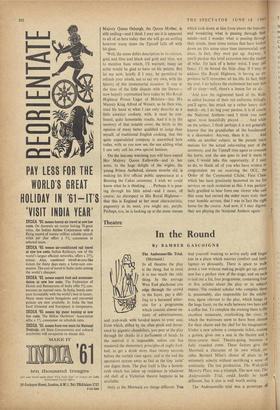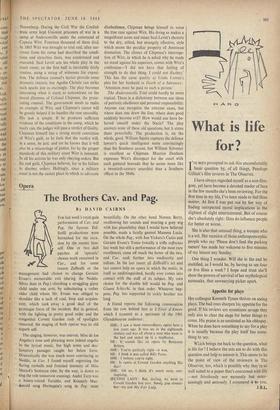Theatre
In the Round
By BAMBER GASCOIGNE The Andersonville Trial. (Mermaid.)
IN all theatres the play is the thing, but in most it is too much the only thing. In the average West End playhouse you edge through the crowd in the foyer, pay a shil- ling to a harassed usher- ette for a programme which consists almost en- tirely of advertisements, and crab-walk with bended knees to your seat, ffom which, stifled by the alien plush and threat- ened by gigantic chandeliers, you peer at the play through the chinks in a parliament of heads. In the interval it is impossible, unless one has mastered the elementary principles of rugby foot- ball, to get a drink more than twenty seconds before the curtain rises again; and at the end the spectators stream away as fast as the tiny 'exits' can digest them. The play itself is like a hermit- crab which has taken up residence in whatever old shell of a Victorian theatre happens to be available.
Only at the Mermaid are things different. You find yourself wanting to arrive early and linger late in a place which marries comfort and intel- ligence so pleasantly. There is space to walk down a row without making people get up; every seat has a perfect view of the stage; and on each is laid out a fat, free programme, containing four or five articles about the play or its subject matter. The resident scholar who compiles these is, presumably, also responsible for the exhibi- tion, again relevant to the play, which hangs in the huge foyer, on the walls between two bars arid a coffee bar. To complete the evening there is the excellent restaurant, overlooking the river, in which the waitresses seem to have been chosen for their charm and the chef for his imagination. Under a new scheme a composite ticket, costing a guinea, gives one a seat in the theatre and a three-course meal. Theatre-going becomes a fully rounded event. These factors give the Mermaid a character of its own which en- ables Bernard Miles's choice of plays to be extremely eclectic without sacrificing a sense of continuity. The last production, The Wakefield Mystery Plays, was a triumph. The new one, The Andersonville Trial, could hardly be more different, but it also is well worth seeing.
The Andersonville trial was a prototype of Nuremberg. During the Civil War the Confed- erate army kept Unionist prisoners of war in a camp at Andersonville under the command of Captain Wirz. Fourteen thousand of them died. In 1865 Wirz was brought to trial and, after sur- vivors from his camp had described the condi- tions and atrocities there, was condemned and executed. Saul Levitt sets his whole play in the court room; so the first half is inevitably fairly routine, using a string of witnesses for exposi- tion. The defence counsel's tactics provide some dramatic interest, but Agatha Christie can strike such sparks just as excitingly. The play becomes interesting when it starts to concentrate on the moral dilemma of Colonel Chipman, the prose- cuting counsel. The government needs to make an example of Wirz, and Chipman's career will be greatly helped if he handles the case smoothly. His task is simple. If he produces sufficient evidence of the conditions in the camp, which he easily can, the judges will pass a verdict of Guilty. Chipman himself has a strong moral conviction of Wirz's guilt, so he feels that the verdict will, in a sense, be just; and yet he knows that it will also be a miscarriage of justice, for by the proper standards of this military court Wirz is innocent. In all his actions he was only obeying orders. But his real guilt, Chipman believes, lay in his failure to disobey orders. Haltingly, since a military court is not the easiest place in which to advocate disobedience, Chipman brings himself to voice the true case against Wirz. His doing so makes a magnificent scene and raises Saul Levitt's rhetoric to the dry, stilted, but strangely effective, style which seems the peculiar property of American dramatists. The climax of Chipman's interroga- tion of Wirz, in which he is asked why he made no stand against his superiors, comes with Wirz's confession-1 did not have that feeling of strength to do that thing. I could not disobey.' This has the same quality as Linda Loman's plea for her husband in Death of a Salesman: `Attention must be paid to such a person.'
The Andersonville Trial could hardly be more topical. There is a dichotomy between our ideas of patriotic obedience and personal responsibility. Anyone can recognise the extreme cases, but where does one draw the line, where does good suddenly become evil? How would one have be- haved oneself under the Nazis? The play answers none of these old questions; but it states them powerfully. The production is, on the whole, good. William Squire captures the defence lawyer's quick intelligence more convincingly than his Southern accent, but William Sylvester is excellent as Chipman. Maurice Denham expresses Wirz's disrespect for the court with such guttural bravado that he seems more like a twentieth-century anarchist than a Southern officer in the l'860s.











































 Previous page
Previous page